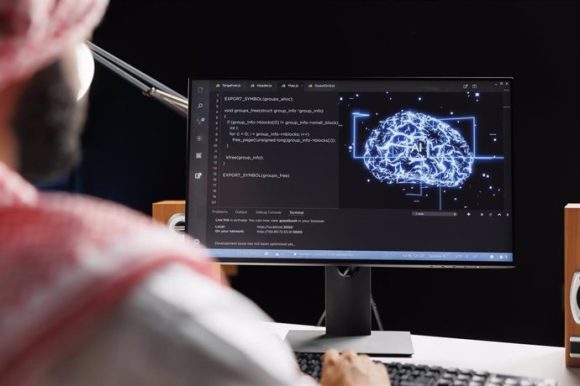Read the full article below (in Italian):
OPIT announces new online Master’s degrees focused on the applications of Artificial Intelligence


By Open Institute of Technology, March 12th 2024
Source here: EuropaPress
OPIT – Open Institute of Technology, an online higher education institution recognized for its innovation and quality, has recently announced the inclusion of new online Master’s degrees. These programs are focused on the practical and theoretical application of emerging technologies, particularly Artificial Intelligence (AI). This initiative provides students with a comprehensive vision of the latest trends, facilitating their insertion into various disciplines linked to the digital world.
Important to highlight is that OPIT is accredited under the prestigious European Qualifications Framework (EQF), ensuring that its study programs, such as the Master’s in Responsible AI and the Master’s in Applied Data Science and AI comply with European educational quality standards. These accreditations not only validate OPIT’s academic excellence, but also ensure that the degrees obtained are recognized and respected internationally, opening doors to job opportunities around the world.
New growth opportunities in the digital environment
The contemporary work landscape demands more and more specialists in Information and Communication Technologies (ICT), driven by the digitalization of all sectors. ICT experts are essential to innovate, manage complex infrastructures and face current challenges such as Cybersecurity and AI. Having specific specialization in these areas creates diverse career opportunities and competitive rewards, as the ICT specialists contribute to innovation and technological development.
OPIT – Open Institute of Technology offers a complete educational experience, immersing students in the world of ICT and Technology. The Institute has developed Bachelor’s and Master’s programs in key areas of the ICT sector, such as Modern Computer Science, Responsible Artificial Intelligence, Enterprise Cybersecurity and Applied Data Science and AI. These programs are designed to provide not only a solid theoretical foundation, but also practical skils that are highly demanded in the job market.
Intensive Master’s degrees in Cybersecurity and Artificial Intelligence
Cybersecurity is essential to protect our digital infrastructures from increasingly sophisticated threats. OPIT has launched a Master’s degree in Enterprise Cybersecurity that prepares students to implement effective security solutions and lead Cybersecurity initiatives in any environment. This program, like the rest of those offered by OPIT, is accredited according to international standards, which ensures that the knowledge and skills acquired are relevant and applicable globally.
The connection between Cybersecurity and AI is essential to develop a comprehensive understanding of today’s security challenges. OPIT offers a Master’s degree in Artificial Intelligence that integrates the technique with ethical considerations, preparing students to lead at the technological forefront. This knowledge allows us to anticipate and proactively respond to emerging threats, guaranteeing the protection of digital assets in an increasingly complex and dynamic environment. In this sense, OPIT – Open Institute of Technology has perfectly understood the need of the current labor market by offering a training program better known as a Master’s degree in Artificial Intelligence. The program combines a technical approach with the ethics of AI and its advanced aspects and covers fields such as Natural Language Processing, Computer Vision, Sensor Systems and Automation in Industry.
OPIT is a leader in the education of digital and technological disciplines, offering programs that combine theory and practice. Students find in these programs an opportunity to expand their horizons and prepare to contribute significantly to their fields of expertise.
For more details about the accreditation and internation recognition of our programs, visit our website: https://www.opit.com/.
Related posts

Source:
- Agenda Digitale, published on June 16th, 2025
By Lokesh Vij, Professor of Cloud Computing Infrastructure, Cloud Development, Cloud Computing Automation and Ops and Cloud Data Stacks at OPIT – Open Institute of Technology
NIST identifies five key characteristics of cloud computing: on-demand self-service, network access, resource pooling, elasticity, and metered service. These pillars explain the success of the global cloud market of 912 billion in 2025
Read the full article below (in Italian):

You’ve probably seen two of the most recent popular social media trends. The first is creating and posting your personalized action figure version of yourself, complete with personalized accessories, from a yoga mat to your favorite musical instrument. There is also the Studio Ghibli trend, which creates an image of you in the style of a character from one of the animation studio’s popular films.
Both of these are possible thanks to OpenAI’s GPT-4o-powered image generator. But what are you risking when you upload a picture to generate this kind of content? More than you might imagine, according to Tom Vazdar, chair of cybersecurity at the Open Institute of Technology (OPIT), in a recent interview with Wired. Let’s take a closer look at the risks and how this issue ties into the issue of responsible artificial intelligence.
Uploading Your Image
To get a personalized image of yourself back from ChatGPT, you need to upload an actual photo, or potentially multiple images, and tell ChatGPT what you want. But in addition to using your image to generate content for you, OpenAI could also be using your willingly submitted image to help train its AI model. Vazdar, who is also CEO and AI & Cybersecurity Strategist at Riskoria and a board member for the Croatian AI Association, says that this kind of content is “a gold mine for training generative models,” but you have limited power over how that image is integrated into their training strategy.
Plus, you are uploading much more than just an image of yourself. Vazdar reminds us that we are handing over “an entire bundle of metadata.” This includes the EXIF data attached to the image, such as exactly when and where the photo was taken. And your photo may have more content in it than you imagine, with the background – including people, landmarks, and objects – also able to be tied to that time and place.
In addition to this, OpenAI also collects data about the device that you are using to engage with the platform, and, according to Vazdar, “There’s also behavioral data, such as what you typed, what kind of image you asked for, how you interacted with the interface and the frequency of those actions.”
After all that, OpenAI knows a lot about you, and soon, so could their AI model, because it is studying you.
How OpenAI Uses Your Data
OpenAI claims that they did not orchestrate these social media trends simply to get training data for their AI, and that’s almost certainly true. But they also aren’t denying that access to that freely uploaded data is a bonus. As Vazdar points out, “This trend, whether by design or a convenient opportunity, is providing the company with massive volumes of fresh, high-quality facial data from diverse age groups, ethnicities, and geographies.”
OpenAI isn’t the only company using your data to train its AI. Meta recently updated its privacy policy to allow the company to use your personal information on Meta-related services, such as Facebook, Instagram, and WhatsApp, to train its AI. While it is possible to opt-out, Meta isn’t advertising that fact or making it easy, which means that most users are sharing their data by default.
You can also control what happens with your data when using ChatGPT. Again, while not well publicized, you can use ChatGPT’s self-service tools to access, export, and delete your personal information, and opt out of having your content used to improve OpenAI’s model. Nevertheless, even if you choose these options, it is still worth it to strip data like location and time from images before uploading them and to consider the privacy of any images, including people and objects in the background, before sharing.
Are Data Protection Laws Keeping Up?
OpenAI and Meta need to provide these kinds of opt-outs due to data protection laws, such as GDPR in the EU and the UK. GDPR gives you the right to access or delete your data, and the use of biometric data requires your explicit consent. However, your photo only becomes biometric data when it is processed using a specific technical measure that allows for the unique identification of an individual.
But just because ChatGPT is not using this technology, doesn’t mean that ChatGPT can’t learn a lot about you from your images.
AI and Ethics Concerns
But you might wonder, “Isn’t it a good thing that AI is being trained using a diverse range of photos?” After all, there have been widespread reports in the past of AI struggling to recognize black faces because they have been trained mostly on white faces. Similarly, there have been reports of bias within AI due to the information it receives. Doesn’t sharing from a wide range of users help combat that? Yes, but there is so much more that could be done with that data without your knowledge or consent.
One of the biggest risks is that the data can be manipulated for marketing purposes, not just to get you to buy products, but also potentially to manipulate behavior. Take, for instance, the Cambridge Analytica scandal, which saw AI used to manipulate voters and the proliferation of deepfakes sharing false news.
Vazdar believes that AI should be used to promote human freedom and autonomy, not threaten it. It should be something that benefits humanity in the broadest possible sense, and not just those with the power to develop and profit from AI.
Responsible Artificial Intelligence
OPIT’s Master’s in Responsible AI combines technical expertise with a focus on the ethical implications of AI, diving into questions such as this one. Focusing on real-world applications, the course considers sustainable AI, environmental impact, ethical considerations, and social responsibility.
Completed over three or four 13-week terms, it starts with a foundation in technical artificial intelligence and then moves on to advanced AI applications. Students finish with a Capstone project, which sees them apply what they have learned to real-world problems.
Have questions?
Visit our FAQ page or get in touch with us!
Write us at +39 335 576 0263
Get in touch at hello@opit.com
Talk to one of our Study Advisors
We are international
We can speak in:


